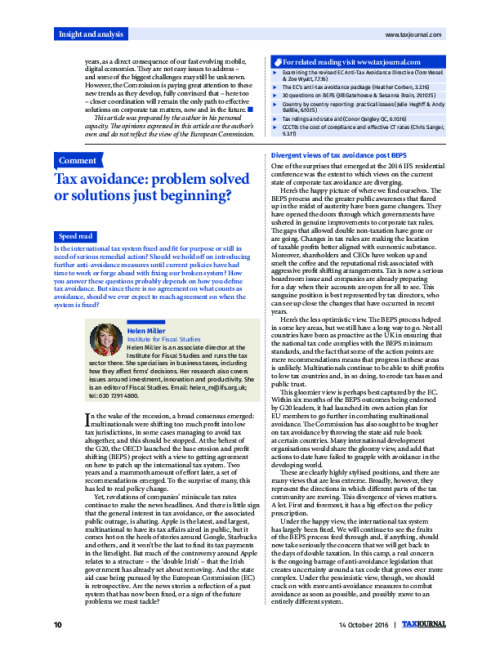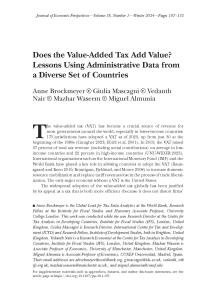Tax avoidance: problem solved or solutions just beginning?
In the wake of the recession, a broad consensus emerged: multinationals were shifting too much profit into low tax jurisdictions, in some cases managing to avoid tax altogether, and this should be stopped. At the behest of the G20, the OECD launched the Base Erosion and Profit Shifting (BEPS) project with a view to getting agreement on how to patch up the international tax system. Two years and a mammoth amount of effort later, a set of recommendations emerged. To the surprise of many, this has lead to real policy change.
Yet, revelations of companies’ miniscule tax rates continue to make the news headlines. And there is little sign that the general interest in tax avoidance, or the associated public outrage, is abating. Apple is the latest, and largest, multinational to have its tax affairs aired in public, but it comes hot on the heels of stories around Google, Starbucks and others, and it won’t be the last to find its tax payments in the limelight. But much of the controversy around Apple relates to a structure – the ‘double-Irish’ – that the Irish government has already set about removing. And the State Aid case being pursued by the European Commission (EC) is retrospective. Are the news stores a reflection of a past system that has now been fixed, or a sign of the future problems we must tackle?
Divergent views of tax avoidance post BEPS
One of the surprises that emerged at the 2016 IFS residential conference was the extent to which views on the current state of corporate tax avoidance are diverging.
Here’s the happy picture of where we find ourselves: The BEPS process and the greater public awareness that flared up in the midst of austerity have been game changers. They have opened the doors through which governments have ushered in genuine improvements to corporate tax rules. The gaps that allowed double non-taxation have gone or are going. Changes in tax rules are making the location of taxable profits better aligned with economic substance. Moreover, shareholders and CEOs have woken up and smelt the coffee and the reputational risk associated with aggressive profit shifting arrangements. Tax is now a serious board room issue and companies are already preparing for a day when their accounts are open for all to see. This sanguine position is best represented by tax directors, who can see up close the changes that have occurred in recent years.
Here’s the less optimistic view: The BEPS process helped in some key areas, but we still have a long way to go. Not all countries have been as proactive as the UK in ensuring that the national tax code complies with the BEPS minimum standards, and the fact that some of the action points are mere recommendations means that progress in these areas is unlikely. Multinationals continue to be able to shift profits to low tax countries and, in so doing, to erode tax bases and public trust. This gloomier view is perhaps best captured by the EC, who within 6 months of the BEPS outcomes being endorsed by G20 leaders, had launched its own action plan for European Union members to go further in combating multinational avoidance. The Commission has also sought to be tougher on tax avoidance by throwing the State Aid rule book at certain countries. Many international development organisations would share the gloomy view, and add that actions to date have failed to grapple with avoidance in the developing world.
These are clearly highly stylised positions, and there are many views that are less extreme. But, broadly, they represent the directions in which different parts of the tax community are moving. This divergence of views matters. A lot. First and foremost, it has a big effect on the policy prescription.
Under the happy view, the international tax system has largely been fixed. We will continue to see the fruits of the BEPS process feed through, and, if anything, should now take seriously the concern that we will get back to the days of double taxation. In this camp, a real concern is the ongoing barrage of anti-avoidance legislation that creates uncertainty around a tax code that grows ever more complex. But under the pessimistic view we should crack on with more anti-avoidance measures to combat avoidance as soon as possible, and possibly move to an entirely different system.
Where does this leave us? The unhappy parts of the tax community are all unhappy in their own ways.
What happened to the consensus?
The consensus was never as unified as it seemed. In large part, the problem boils down to language. What is avoidance? It’s a notoriously slippery concept. It describes the murky grey area between the un-codified ‘spirit of the law’ and the hard boundary of tax evasion. One man’s tax avoidance is another man’s sensible tax planning. If a business shifts its debt across borders to ensure that interest costs can be deducted in a tax efficient manner, is that an unacceptable abuse of the rules or sensible business practice? Is it at odds with the spirit of the law if a company chooses to hold intellectual property in a low tax jurisdiction, and does the ‘spirit’, rather than the letter, of the law even matter?
If there are no agreed answers to questions such as these, it should be no surprise that we haven’t reached a system that has widespread support.
Herein lies an economist’s view: BEPS was an ambitious process that did manage to provide some patches to an international tax system creaking under the pressure of multinational activity. But the project never tried to deal with the real problem that our approach to international tax system is old fashioned and our economy is not.
Will we ever be happy with a system designed for a bygone age?
This is an oft-told story: the corporate tax system was designed at a time when cross border activities were largely confined to the import and export of physical goods. Moreover, when the system of allocating taxing rights was decided at the start of the last century, the key concern was that profits would be taxed multiple times as they flowed through various jurisdictions. To prevent this, the League of Nations came up with the solution that ‘source’ countries – those where the value creation was happening – would get the right to tax profits first while other countries wishing to tax the same income would have to give a credit for the tax already paid. Where companies created value by combining activities in different locations, the arm’s length principle (embedded in transfer pricing rules) would provide an elegant solution: treat all transactions that take place within a firm but across tax borders, as if they occurred between independent companies. All profits can thereby be allocated to the source of value creation.
Today, it is commonplace for multinationals to create goods and services by combining inputs – raw materials, machines, people, ideas, finance – from many countries. The United Nations estimates that around 80% of global trade is linked to multinationals’ production networks. The iphone has become an iconic example of this trend. The original smartphone was designed and developed in the USA and few would be surprised to hear that the final product is assembled in China. Its production sucks in raw materials and components from around the globe, including vital rare earths from China, displays from Japan, sensors from South Korea and gyroscopes from a French-Italian company based in Switzerland. And, of course, Apple make money by marketing and selling to consumers located all over the world. Requiring the tax system to fairly allocate taxable profits to all of the governments who would like a slice of the apple is a tall order.
Even putting aside the scope for tax avoidance, the arm’s length principle does not always produce a clear answer to where value was created, almost always leaving substantial room for disagreement and therefore for firms to chose prices that minimise tax. Governments could perhaps put more effort into pushing back against transfer pricing that minimizes tax liabilities. But there is no sign that allocating profits using transfer prices is going to get any easier.
There is another unpleasant feature of our source based system: countries have an incentive to compete to attract activity and income. While reports of the death of the corporate income tax have been exaggerated –it still brings in 7% of UK government revenues – we have seen plenty of signs of tax competition. Most notably, rates in many countries have come down substantially. The UK’s headline rate was 52% is 1981. It will be 17% in 2020. And there are plenty of policies – Patent Box is a recent example – that are put in place to entice multinationals.
What does this all mean? In short, even if the BEPS project and related initiatives succeed in preventing the most egregious forms of avoidance, we’ll still be using a system that is not well suited to taxing firms that operate globally. To boot, we’ll still have a system that pushes some of our best talents into the business of minimising tax payments.
Is transparency the key to happiness?
There seems to be one remaining area of consensus in the tax community: businesses should do more to explain their taxes. This will be particularly important as companies start to release more information about their tax strategies, and eventually, probably, their country-by-country reports.
Fostering better understanding of the tax system is a good idea. Part of the outrage that arises when large companies are seen to be getting away with paltry tax rates is based on a misunderstanding of what the government is trying to tax. With greater transparency and scrutiny should come greater explanation. We should all work to ensure that bad tax policy is never introduced or maintained on the back of public misunderstanding of how the system works.
But, if we succeed in explaining the system, we must also be open to the possibility that many will not like truth. The system we operate was not designed to produce the alignment between tax payments and sales or employment that many expect to see. And we will continue to see governments offering favourable tax conditions, and businesses taking them up on the offers.
Given this, perhaps it is time to properly debate what an alternative would look like. The idea of scraping the current corporate tax system and starting again might sound like a fanciful academic exercise, and it certainly isn’t going to happen tomorrow. But alternatives are entering mainstream discussions. The EC is pushing hard to move to using a formula to allocate profits across the EU; the USA already does this across the states. Many would like to see the UN police tax allocation issues through a global tax body. The US presidential campaign has been awash with ideas for radical corporate tax reforms, including removing the tax altogether or reimagining the system such that profits are taxed in the location of final consumers (a ‘destination based corporate income tax’). And let’s not forget: the corporate tax is undergoing change on an almost constant basis. We could continue to compete with other countries and apply sticking plasters where gaps emerge. Or, we could engage with the debates about what a better system would look like.
This article was first published by Tax Journal and is reproduced here with permission (a full copy in PDF is available below).










